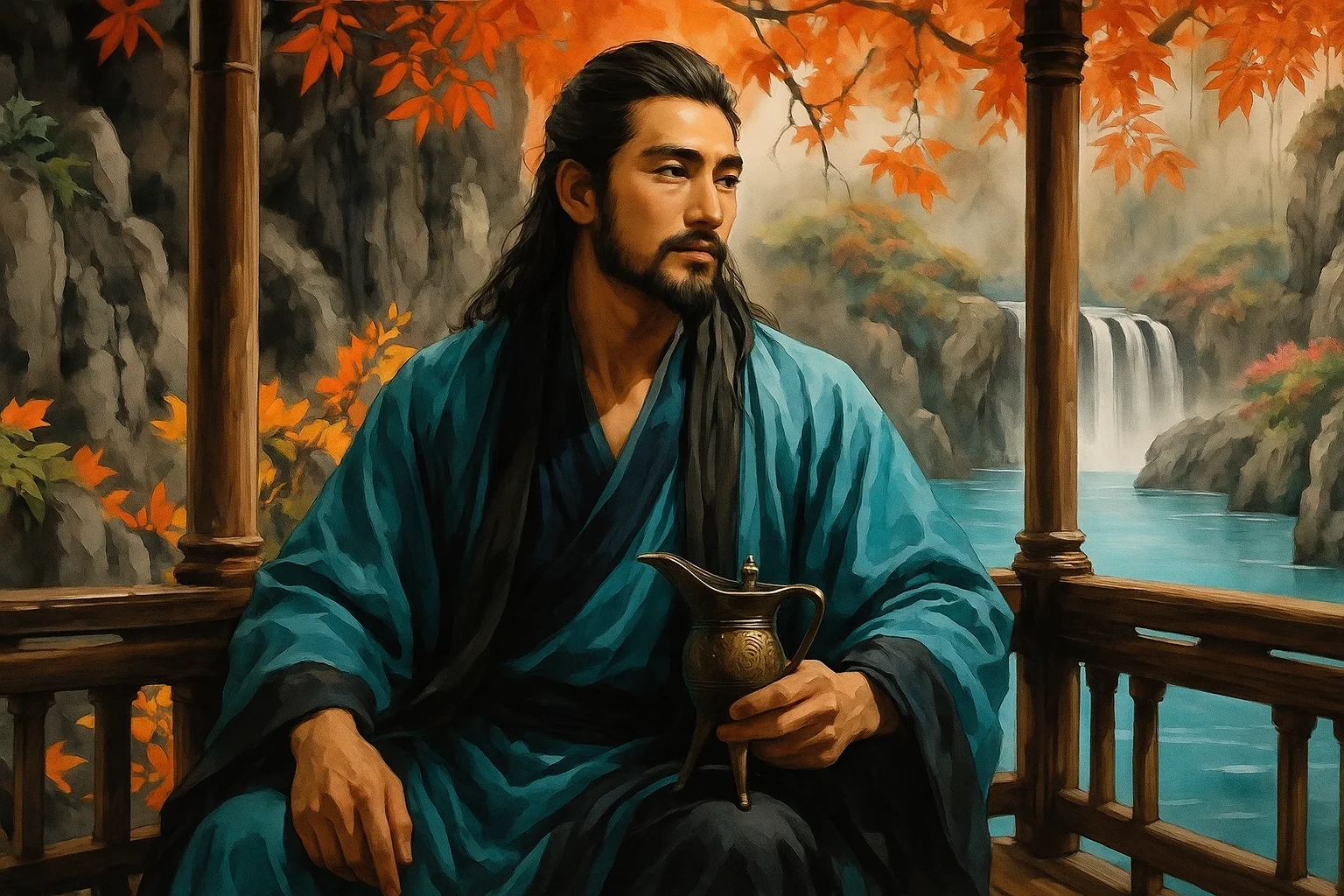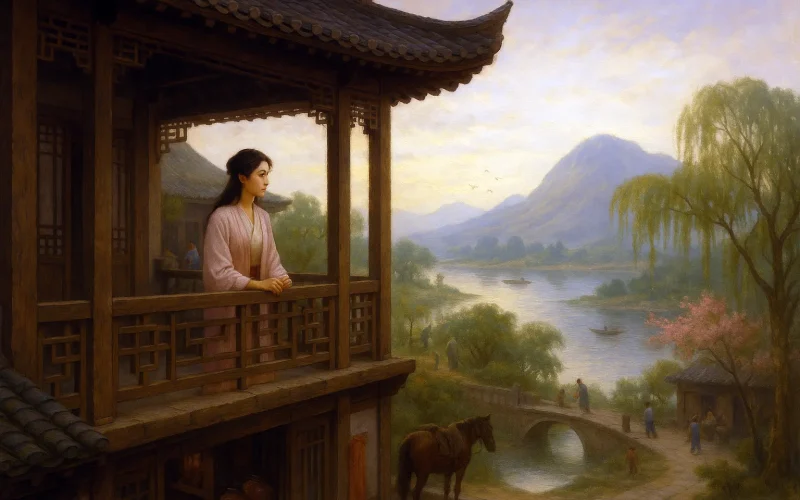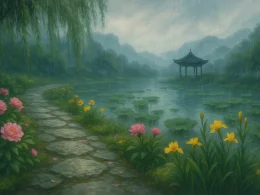At the roadside inn, mume blossoms fade;
By the stream bridge, willow fronds sway thin.
Grass-scented warmth stirs my horse’s reins—
But my parting grief, the farther I ride,
Grows endless as the springtime river’s flow.
An inch of tender heartbreak,
A teardrop’s crystal weight.
"Don’t lean on the tower’s perilous rails!"
Beyond the flattening wilds stand spring-green peaks—
And you, my traveler,
Are beyond even those distant hills.
Original Poem
「踏莎行 · 候馆梅残」
候馆梅残,溪桥柳细。草薰风暖摇征辔。
离愁渐远渐无穷,迢迢不断如春水。寸寸柔肠,盈盈粉泪。楼高莫近危阑倚。
欧阳修
平芜尽处是春山,行人更在春山外。
Interpretation
Composed during Ouyang Xiu's travels as a provincial official, this lyric poem expresses longing for distant loved ones through the interwoven imagery of spring scenery and parting grief. Shifting perspectives between the traveler's immediate view and imagined scenes of a pining woman, it creates a delicate yet profound portrayal of separation. Recognized as a classic of the Wanyue School's "parting sorrow" genre, the work demonstrates remarkable emotional subtlety and structural sophistication.
First Stanza: "候馆梅残,溪桥柳细。草薰风暖摇征辔。离愁渐远渐无穷,迢迢不断如春水。"
Hòu guǎn méi cán, xī qiáo liǔ xì. Cǎo xūn fēng nuǎn yáo zhēng pèi. Lí chóu jiàn yuǎn jiàn wú qióng, tiáo tiáo bù duàn rú chūn shuǐ.
Withered mume blooms by post-house walls,
Slender willows grace the creek bridge.
Fragrant grass, warm breeze—my reins tremble as I ride.
Parting grief grows with each league,
Endless as spring streams that wind through mountain ridges.
The stanza masterfully contrasts vernal vitality (warmth, fragrance) with depletion (withered mume), mirroring the traveler's inner conflict. The kinetic "trembling reins" (摇征辔) externalize emotional unrest, while the hydrological metaphor (春水) spatializes temporal sorrow—the farther the journey, the deeper the grief flows.
Second Stanza: "寸寸柔肠,盈盈粉泪。楼高莫近危阑倚。平芜尽处是春山,行人更在春山外。"
Cùn cùn róu cháng, yíng yíng fěn lèi. Lóu gāo mò jìn wēi lán yǐ. Píng wú jìn chù shì chūn shān, xíng rén gèng zài chūn shān wài.
Each inch of tender heart now torn,
Pearled tears upon powdered cheeks.
"Don't lean on tower railings!"—my silent plea.
Beyond the plains spring peaks on peaks,
Your traveler strides past where those mountain lines meet sky.
The perspective shifts to the imagined beloved, with visceral corporeal imagery (柔肠, 粉泪) conveying emotional intensity. The self-reflexive warning (莫近危阑倚) reveals protective tenderness, while the telescoping landscape (plains→mountains→beyond) geometrically amplifies separation's cruel mathematics. The final line's spatial transcendence (山外) paradoxically affirms spiritual connection across physical distance.
Holistic Appreciation
This work stands as a quintessential example of Ouyang Xiu’s graceful and restrained lyric style, distinguished by its delicate conception and poignant emotional depth within Song poetry. The upper stanza depicts spring scenery encountered by a traveler—though beautiful, the landscape stirs boundless sorrow of separation. The lower stanza shifts perspective to a pining woman gazing from her tower, where the traveler, through empathetic imagination, envisions his beloved’s longing for him. The poet masterfully intertwines spatial expansion with psychological intimacy, layering scenes and emotions until they extend into the distant reverie of "beyond the spring mountains," embedding profound sorrow within tender beauty.
What merits special acclaim is the poet’s meticulous portrayal of mutual longing. Rather than directly expressing his own grief, he refracts it through the woman’s yearning, achieving a bidirectional emotional resonance—authentic in feeling and profound in depth.
Artistic Merits
- From Scene to Emotion, Objects Evoke Sorrow: The upper stanza begins with spring imagery, naturally transitioning from admiration to parting grief, with apt and flowing metaphors.
- Interweaving Real and Imagined, Fusion of Scene and Sentiment: From the tangible "spring waters" to the woman’s visions and the distant "beyond spring mountains," space unfolds layer by layer, intensifying emotion.
- Psychological Empathy, Deep and Far-Reaching Feeling: The poet does not vent directly but inhabits the woman’s perspective, channeling his emotions through hers—love profound, longing keen.
- Elegant Diction, Rich Imagery: Reduplicated words like "glistening," "inch by inch," and "endless" enhance the lyrical rhythm; terms such as "roadside inn," "lofty rail," and "vast plains" are concise yet vividly pictorial.
Insights
This lyric reveals how separation does not diminish affection with time and distance but deepens it along the journey’s expanse. Ouyang Xiu expresses the traveler’s tender concern for the one left behind in an intensely warm manner, transforming parting sorrow into empathetic imagination. It reminds us that true love lies not only in the passion of union but also in the shared understanding during separation.
In life, partings may be inevitable, but like the poet, we can nurture connection by attuning to each other’s hearts across the divide. Love demands not just the desire to be understood but the willingness to understand. The most moving emotions often reside not in grand declarations but in gentle admonitions like "don’t lean too close to the perilous rail" or quiet yearnings like "beyond the spring mountains"—precisely the emotional wisdom and aesthetic realm that graceful lyric poetry imparts.
About the Poet

Ouyang Xiu (欧阳修, 1007 - 1072), a native of Yongfeng, Jizhou (present-day Jiangxi Province), emerged as the preeminent literary figure of the Northern Song Dynasty. After attaining the jinshi degree in 1030, he spearheaded a literary reform movement that rejected the ornate Xikun style prevalent at court. As a mentor who nurtured literary giants like Su Shi and Zeng Gong, he laid the foundation for the golden age of Northern Song literature. Recognized as one of the "Eight Great Prose Masters of Tang and Song," Ouyang stands as the pivotal figure in the transformation of Northern Song literary culture.












